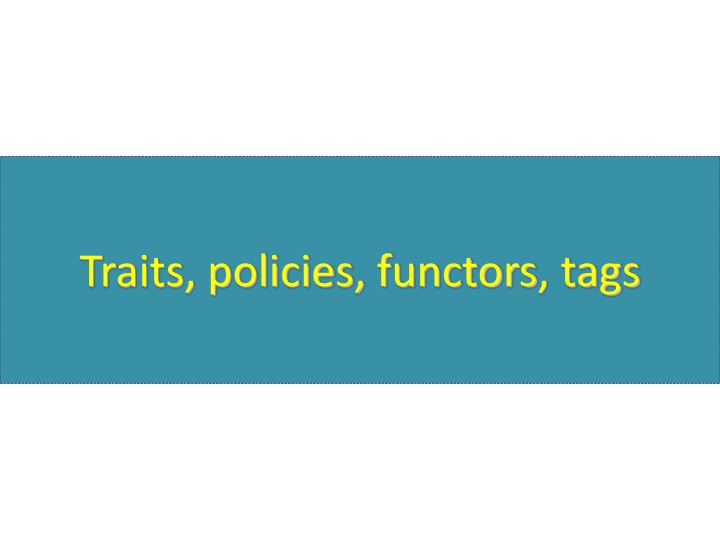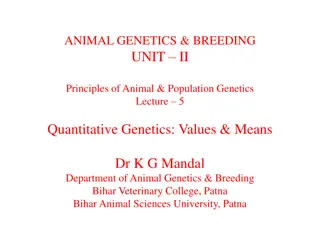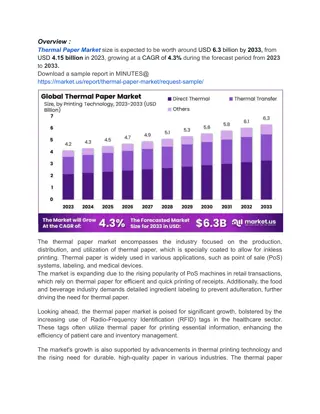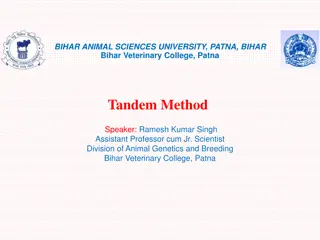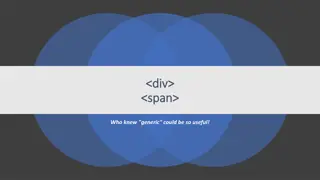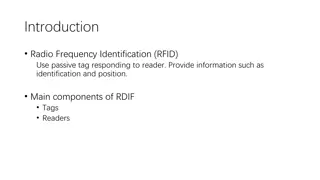Traits, Policies, Functors, Tags in C++
Traits, policies, functors, and tags play crucial roles in C++ programming. Traits define Type attributes without creating objects, policies customize template behavior, functors act as functions passed as arguments, and tags carry compile-time information. Policy classes enable passing multiple types/functions as one argument, and their use simplifies generic code parameters. Discover how these elements shape C++ programming with their unique functionalities and distinctions.
Uploaded on Mar 09, 2025 | 2 Views
Download Presentation

Please find below an Image/Link to download the presentation.
The content on the website is provided AS IS for your information and personal use only. It may not be sold, licensed, or shared on other websites without obtaining consent from the author.If you encounter any issues during the download, it is possible that the publisher has removed the file from their server.
You are allowed to download the files provided on this website for personal or commercial use, subject to the condition that they are used lawfully. All files are the property of their respective owners.
The content on the website is provided AS IS for your information and personal use only. It may not be sold, licensed, or shared on other websites without obtaining consent from the author.
E N D
Presentation Transcript
Traits, policies, tags, etc. Traits Class/struct template not designed to be instantiated into objects; contents limited to: type definitions (via typedef/using or nested struct/class) constants (via static constexpr) static functions Used as a compile-time function which assigns types/constants/run-time functions to template arguments Policy class Non-template class/struct, usually not instantiated Compile-time equivalent of objects, containing types/constants/run-time functions Passed as template argument to customize the behavior of the template Functor Class/struct containing non-static function named operator() Usually passed as run-time argument to function templates Functor acts as a function, created by packing a function body together with some data stored or referenced in the body (closure) Tag class Empty class/struct Passed as run-time argument to function templates Used to carry a compile-time information by their types themselves Classes/structs are distinguished by their name, not by contents
Policy class Policy class Non-template class/struct, usually not instantiated Compile-time equivalent of objects, containing types/constants/run-time functions Passed as template argument to customize the behavior of the template template< typename P> class container { public: container(std::size_t n) { m_ = P::alloc(n); /*...*/ } private: typename P::pointer m_; }; struct my_policy { using pointer = void*; static pointer alloc(std::size_t s) { /*...*/ } }; container< my_policy> k; Motivation: Policy class allows to pass several types/constants/functions as one argument Policy class is the only way to pass a function as a template argument Policy classes are distinguished by name, not by contents This could be an advantage or a disadvantage, depending on context
Policy classes Policy class works as a set of parameters for generic code Types (defined by typedef/using or nested classes/enums) Constants (defined by static constexpr) Functions (defined as static) The use of policy class instead of individual arguments... ...makes instantiated template names shorter ...avoids order-related mistakes This is the only way how functions may become parameters of a template In simple cases, policy classes are not instantiated into objects Some policy-class tricks would not work well when instantiated NPRG041 Programming in C++ - 2016/2017 David Bedn rek 4
Instantiated policy classes Some policy classes may be used as objects Such objects carry run-time options to policies; policy functions are not static template< typename P> class container { public: container(std::size_t n, const P & p) : p_(p) { m_ = p_.alloc(n); /*...*/ } private: P p_; // the template usually contains a policy-object typename P::pointer m_; // compile-time properties extracted from policy-class }; class my_policy { public: using pointer = void*; pointer alloc(std::size_t s) { /*...*/ } my_policy(heap * h) : my_heap_(h) {} private: heap * my_heap_; }; my_policy mp(/*...*/); container< my_policy> k( mp); Functors are special cases of instantiated policy classes no type members, only one member function named operator() NPRG041 Programming in C++ - 2016/2017 David Bedn rek 5
Functors Functor Class/struct containing non-static function named operator() Usually non-template, but template cases exists (std::less<T>) Since C++11, mostly created by the compiler as a result of a lambda expression Usually passed as run-time argument to function templates Example: std::sort receives a functor representing a comparison function For class templates, a functor becomes both a template argument to the class and a value argument to its constructor Example: std::map receives a functor representing a comparison function Functor acts as a function, created by packing a function body together with some data referenced in the body (closure) Functionality (i.e. the function implementation) selected at compile-time by template instantiation mechanism Functionality parameterized at run-time by the data members of the functor object If there is no data member in the functor, the functionality is equivalent to a non- instantiated policy class containing a static function However, the functor must be instantiated and passed as an object since operator() cannot be static
Instantiated policy classes vs. object oriented programming Effect similar to instantiated policy classes can be implemented using OOP The "policy" must have an explicit interface with virtual functions class abstract_allocator { public: virtual void * alloc(std::size_t) = 0; /*...*/ }; There is no compile-time argument; a pointer to the abstract class is passed at runtime class container { public: container(std::size_t n, abstract_allocator * p) : p_(p) { m_ = p_->alloc(n); /*...*/ } private: abstract_allocator * p_;// instead of a policy-object, there is a pointer to an abstract class void * m_; // types can't be extracted by OOP means }; A concrete "policy" must inherit the interface; the functions are now virtual class my_allocator : public abstract_allocator { public: virtual void * alloc(std::size_t s) override { /*...*/ } my_policy(heap * h) : my_heap_(h) {} private: heap * my_heap_; }; my_allocator ma(/*...*/); container k( & ma); // because OOP requires pointers, ownership of the "policy-object" must be solved somehow OOP is a runtime mechanism significantly slower than policy classes in addition, it cannot supply compile-time configuration (types, constants) NPRG041 Programming in C++ - 2016/2017 David Bedn rek 7
Static vs. dynamic polymorphism Polymorphism = ability to customize behavior of existing code Static/compile-time polymorphism Behavior customized by compile-time (template) arguments There may be a run-time component policy-objects/functors Customization: The generic code calls non-virtual member functions of a class passed as template argument The run-time data are used inside these functions Duck typing: These functions may have any signature compatible with the call They can be templated themselves The compiler compiles the generic code when the template is instantiated with specific policy-object/functor type The compiler knows exactly which function is invoked at the point of customization Function integration (aka. inlining) or inter-procedural optimization possible Dynamic/run-time polymorphism Behavior customized by run-time arguments (and run-time type information contained inside objects) Customization: The universal code calls virtual member functions via a pointer/reference to an abstract class passed as run-time argument Strong typing: The virtual functions must have exactly the signature defined by the abstract class Virtual functions can not be templates The universal code is not a template compiled only once There is an indirect virtual-function call at the customization point No optimization possible for the compiler Slower than static/compile-time polymorphism However, the binary code is smaller relevant in embedded applications etc. Required when behavior must be switched at run time Polymorphic containers, GUI systems, middleware, ... NPRG041 Programming in C++ - 2016/2017 David Bedn rek 8
Static vs. dynamic polymorphism Prefer static/compile-time polymorphism whenever possible Use dynamic/run-time polymorphism only when needed Polymorphic containers, GUI systems, middleware, ... Example: Functors are a case of static polymorphism Functors/lambdas will become arguments of templated functions It is impossible to directly mix different lambdas in one expression/container cond ? [](int & x){ ++x; } : [](int & x){ --x; } // ERROR k[0] = [](int & x){ ++x; }; k[1] = [](int & x){ --x; }; // ERROR These cases may be solved using std::function std::vector< std::function<void(int)>> k; k[0] = [](int & x){ ++x; }; k[1] = [](int & x){ --x; }; // OK std::function is implemented using dynamic polymorphism An internal virtual function has a templated implementation Instantiation triggered by the conversion operator of std::function The outer interface of std::function is again a functor std::function acts as a dynamic polymorphism between two static-polymorphism interfaces NPRG041 Programming in C++ - 2016/2017 David Bedn rek 9
Etymology Trait [FR] From latin tractus Action of firing a projectile Le javelot est une arme de trait. [The javelin is a thrown weapon.] Traction Animaux de trait. [Draft animals.] Line drawn in one movement Un trait noir. [A black line.] Characteristic facial lines Elle a de jolis traits. [She has pretty curves.] Characteristic of a person, a thing Traits saillants d une rencontre. [Highlights of a meeting.] The term trait is used in psychology and evolutional biology The set of psychological/evolutional properties of an individual is termed traits From there, it was acquired in programming, almost always as traits : The set of compile-time properties of a programming language item (usually a type) NPRG041 Programming in C++ - 2016/2017 David Bedn rek 10
Traits Traits Class/struct template not designed to be instantiated into objects; contents limited to: type definitions (via typedef/using or nested struct/class) constants (via static constexpr) static functions Used as a compile-time function which assigns types/constants/run-time functions to template arguments Most frequently declared with one type argument Used to retrieve information related to the type Example: std::numeric_limits<T> contains constants and functions describing the properties of a numeric type T Conventions and syntactic sugar When a traits class contains just one type, the type is named type C++11: Usually made accessible directly via template using declaration named ..._t template< typename T> using some_traits_t = typename some_traits< T>::type; When a traits class contains just one constant, the constant is named value C++14: Usually made accessible directly via template variable named ..._v template< typename T> inline constexpr some_type some_traits_v = some_traits< T>::value;
Traits - example Traits are useful when implementing a template acting on unknown type std::numeric_limits<T>::lowest() returns the minimal (finite) value of a numeric type template< typename T> T vector_max(const std::vector<T> & v) { T m = std::numeric_limits<T>::lowest(); for (auto && a : v) m = std::max(m, a); return m; } This example has too narrow interface a better version uses iterators: Another traits class required to determine the element type: template< typename IT> std::iterator_traits<IT>::value_type range_max(IT b, IT e) { using T = std::iterator_traits<IT>::value_type; T m = std::numeric_limits<T>::lowest(); for (; b != e; ++b) m = std::max(m, *b); return m; }
std::iterator_traits Container-manipulation functions usually use iterators in their interface Such functions need to know some properties of the underlying containers If IT is an iterator type, std::iterator_traits<IT> contains the following types: difference_type a signed type large enough to hold distances between iterators usually std::ptrdiff_t value_type the type of an element pointed to by the iterator reference a type acting as a reference to an element this is the type actually returned by operator* of the iterator usually value_type& or const value_type& it may be a class simulating a reference (e.g. for vector<bool>) pointer a type acting as a pointer to an element value_type*, const value_type*, or a class simulating a pointer iterator_category one of predefined tags describing the category of the iterator std::input_iterator_tag, std::output_iterator_tag, std::forward_iterator_tag, std::bidirectional_iterator_tag, or std::random_access_iterator_tag shall be used via template specialization or using std::is_same_v These properties can also be determined using C++20 concepts new versions of algorithms in std::ranges do not rely on std::iterator_traits
std::iterator_traits Implemented in standard library as template< typename IT> struct iterator_traits { using difference_type = typename IT::difference_type; using value_type = typename IT::value_type; using reference = typename IT::reference; using pointer = typename IT::pointer; using iterator_category = typename IT::iterator_category; }; Any class intended to act as an iterator must define the five types referenced above The five types shall be accessed only indirectly through std::iterator_traits Not required if the iterators are passed only to modern concept-aware generic code Since raw pointers may act as iterators, there is a partial specialization: template< typename T> struct iterator_traits<T*> { using difference_type = std::ptrdiff_t; using value_type = std::remove_cv_t<T>; using reference = T&; using pointer = T*; using iterator_category = std::random_access_iterator_tag; }; std::remove_cv_t<T> removes any const/volatile modifiers from T
std::is_reference_v Traits returning constants, e.g. std::is_reference_v<T> Based on the traits template std::is_reference<T> general template template< typename T> struct is_reference<T> : std::false_type {}; partial specializations have higher priority template< typename T> struct is_reference<T&> : std::true_type {}; template< typename T> struct is_reference<T&&> : std::true_type {}; Uses two type aliases (logically acting as policy classes): using false_type = std::integral_constant<bool, false>; using true_type = std::integral_constant<bool, true>; These are aliases of a particular case of a more general auxiliary class: template< typename U, U v> struct integral_constant { static constexpr U value = v; // ... there are more members here ... explanation later }; The result is represented by a static constexpr member named value by convention For convenience, the result may be accessed using the global variable alias: template< typename T> inline constexpr is_reference_v = is_reference<T>::value;
Tag class Tag class Empty class/struct A tag class acts like a compile-time enumeration constant Unlike an enum type, the set of tag classes may be independently extended It is limited to compile-time, therefore there is no need to assign unique numbering Two use cases Tag classes are used as type arguments to templates or member types of a class Example: the tags used for iterator_category In this case, a tag class is never instantiated into object, it is also usually empty Tag classes are used as parameters of a function The tag class is instantiated into an empty runtime object (usually optimized out by the compiler) This allows to distinguish between different functions of the same name (e.g. constructors) In advanced cases, tag classes are templates They are used to carry the values of their template arguments
Tag arguments Distinguishing constructors Another use-case for value-less function arguments All constructors have the same name the name cannot be used to specify the required behavior Example: std::optional<T> can store T or nothing using string_opt = std::optional< std::string>; string_opt x; // initialized as nothing assert(!x.has_value()); string_opt y(std::in_place); // initialized as std::string() assert(y.has_value() && (*y).empty()); string_opt z(std::in_place, Hello ); // initialized as std::string( Hello ) assert(z.has_value() && *z == Hello ); Implementation: struct in_place_t {}; // a tag class inline constexpr in_place_t in_place; // an empty variable of tag type template< typename T> class optional { public: optional(); // initialize as nothing template< typename... L> optional( in_place_t, L &&... l); // initialize by constructing T from the arguments l };
Employing type non-equivalence with tag classes Type non-equivalence template< typename P> Two classes/structs/unions/enums are always considered different class Value { even if they have the same contents double v; Two instances of the same template are considered different if their parameters are different // ... }; It also works with empty classes struct mass {}; Called tag classes struct energy {}; Usage: To distinguish types which represent different things using the same implementation Value< mass> m; Value< energy> e; Physical units Indexes to different arrays e = m; // error Similar effect to enum class
